|
|
 |
 During the period from May 20 to 22, 2003, the 31st peer review was carried out at the Ariake Machinery Works (Tamana-gun, Kumamoto Prefecture), Hitachi Zosen Corporation (Hitachi Zosen Diesel & Engineering Co., Ltd.). Over the two-day period of the peer review, Dr. Yoshida, Professor at Kumamoto University, participated as the observer from outside of NSnet. We would like to present his opinions and impressions, which we have compiled below. During the period from May 20 to 22, 2003, the 31st peer review was carried out at the Ariake Machinery Works (Tamana-gun, Kumamoto Prefecture), Hitachi Zosen Corporation (Hitachi Zosen Diesel & Engineering Co., Ltd.). Over the two-day period of the peer review, Dr. Yoshida, Professor at Kumamoto University, participated as the observer from outside of NSnet. We would like to present his opinions and impressions, which we have compiled below.
 The purport of introducing the observer this time and the contents of the observer evaluation (perspectives) have been indicated separately. The purport of introducing the observer this time and the contents of the observer evaluation (perspectives) have been indicated separately.
|
1. Introduction

|
 I am working in the area of Group Dynamics, the purpose of which is to understand humans through their relations to groups. Having interest in such tasks as how safety should be ensured in an organization and how groups should act in order to do so, I have been pursuing such studies. It is to observe and actively collect data on leaders' or subordinates' actions occurring in organizations and groups, and develop techniques and training methods based thereon to improve leadership and establish a climate or norm concerning safety. I will present my opinions and impressions from such a viewpoint as an observer. I am working in the area of Group Dynamics, the purpose of which is to understand humans through their relations to groups. Having interest in such tasks as how safety should be ensured in an organization and how groups should act in order to do so, I have been pursuing such studies. It is to observe and actively collect data on leaders' or subordinates' actions occurring in organizations and groups, and develop techniques and training methods based thereon to improve leadership and establish a climate or norm concerning safety. I will present my opinions and impressions from such a viewpoint as an observer.
|
2. About the Peer Review

|
 The skills necessary to perform one's job are technical skills (*1) and human skills (*2). From my standpoint, I decided to observe the peer review from the perspective of human skills. In other words, I observed the peer review from the viewpoint of human relations. The skills necessary to perform one's job are technical skills (*1) and human skills (*2). From my standpoint, I decided to observe the peer review from the perspective of human skills. In other words, I observed the peer review from the viewpoint of human relations.
 On the first day, I had the impression that "it would be favorable to have more in-depth opinion exchange." On the second day, however, I observed that the review took on greater depth and that the organization undergoing the review showed an attitude of talking about more specific instances and frankly expressing difficult issues. Under such circumstances, I was able to realize that human relations change over time. Like individuals, groups also develop and grow. This peer review system is a group phenomenon involving those who undergo reviews and those who conduct reviews. One cannot reveal one's true intention by merely being told to "say what you feel like saying." It requires a human relationship of mutual trust, and it takes a certain amount of time to develop such a relationship. On the first day, I had the impression that "it would be favorable to have more in-depth opinion exchange." On the second day, however, I observed that the review took on greater depth and that the organization undergoing the review showed an attitude of talking about more specific instances and frankly expressing difficult issues. Under such circumstances, I was able to realize that human relations change over time. Like individuals, groups also develop and grow. This peer review system is a group phenomenon involving those who undergo reviews and those who conduct reviews. One cannot reveal one's true intention by merely being told to "say what you feel like saying." It requires a human relationship of mutual trust, and it takes a certain amount of time to develop such a relationship.
|
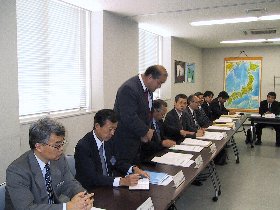
Observer confirming openings
(right side)
|
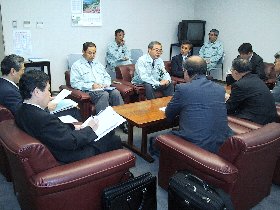
Observer confirming situation of
interviews (left front)
|
|
3. Group Development

|
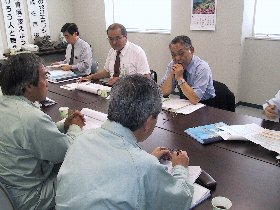
Observer confirming situation of
document examination (far left)
|
 Now, let us consider the growth of a group. In the early stages after a group has just been formed, a relationship referred to as the "Stage of Defense" prevails. Members have just met one another and have no information whatsoever about the others. They tend to be defensive as the instinct of self-defense emerges. Under such circumstances, one is afraid of being hurt by others and continues harmless talk and topics. When a group is in this defensive state of mind, real intentions cannot be expressed even if one is encouraged to "speak frankly." In organizations and groups in this stage, communication itself has not materialized. Now, let us consider the growth of a group. In the early stages after a group has just been formed, a relationship referred to as the "Stage of Defense" prevails. Members have just met one another and have no information whatsoever about the others. They tend to be defensive as the instinct of self-defense emerges. Under such circumstances, one is afraid of being hurt by others and continues harmless talk and topics. When a group is in this defensive state of mind, real intentions cannot be expressed even if one is encouraged to "speak frankly." In organizations and groups in this stage, communication itself has not materialized.
 The "Stage of Defense" is followed by the "Stage of Group Organization." In this stage, they feel that they are working together through some act of fate, and an atmosphere is created in which they feel, "Since fate has brought us together, let's make the best of it and enjoy." The "Stage of Defense" is followed by the "Stage of Group Organization." In this stage, they feel that they are working together through some act of fate, and an atmosphere is created in which they feel, "Since fate has brought us together, let's make the best of it and enjoy."
 It may seem sufficient that the status of a group has reached the "Stage of Group Organization." However, it requires one more step for the group to develop and grow in a true sense. And this is the "Stage of Mutual Growth." At this stage, intense communication occurs. For example, "This should be thought over a little" and "You are misunderstood by others because you do such-and-such a thing." It is understood, however, that such suggestions and comments serve a positive purpose in one's growth. When a group has developed to this stage, one can confess one's real intentions. Applying this to an organization, it can prevent so-called scandals because one can "say what seems to be difficult to say" and "honestly communicate one's failure." It may seem sufficient that the status of a group has reached the "Stage of Group Organization." However, it requires one more step for the group to develop and grow in a true sense. And this is the "Stage of Mutual Growth." At this stage, intense communication occurs. For example, "This should be thought over a little" and "You are misunderstood by others because you do such-and-such a thing." It is understood, however, that such suggestions and comments serve a positive purpose in one's growth. When a group has developed to this stage, one can confess one's real intentions. Applying this to an organization, it can prevent so-called scandals because one can "say what seems to be difficult to say" and "honestly communicate one's failure."
 These relationships of "Group Development" seem to be applicable to peer review. In the beginning, people know nothing about each other. So in the first half of Day 1, defensive feelings more or less tend to prevail. Over time, however, mutual relationship develops in a favorable direction. It is the very "Stage of Group Organization." On Day 2, moreover, there seems to emerge a frame of mind in which they say, "Let's speak more straightforwardly." These relationships of "Group Development" seem to be applicable to peer review. In the beginning, people know nothing about each other. So in the first half of Day 1, defensive feelings more or less tend to prevail. Over time, however, mutual relationship develops in a favorable direction. It is the very "Stage of Group Organization." On Day 2, moreover, there seems to emerge a frame of mind in which they say, "Let's speak more straightforwardly."
 Let's look at the idea of "Group Development" from two different viewpoints. One of these viewpoints is about the development of peer review itself. It is expected that those who are undergoing the review and their reviewers will make efforts to mutually develop their relationship to the "Stage of Mutual Growth." as fast as possible. The other viewpoint is for Hitachi Zosen to develop all of its work groups to the "Stage of Mutual Growth." If they have already reached this stage, I would like Hitachi Zosen to seriously consider measures to maintain such a favorable status quo. Let's look at the idea of "Group Development" from two different viewpoints. One of these viewpoints is about the development of peer review itself. It is expected that those who are undergoing the review and their reviewers will make efforts to mutually develop their relationship to the "Stage of Mutual Growth." as fast as possible. The other viewpoint is for Hitachi Zosen to develop all of its work groups to the "Stage of Mutual Growth." If they have already reached this stage, I would like Hitachi Zosen to seriously consider measures to maintain such a favorable status quo.
|
4. Moral Hazard and Morale Hazard

|
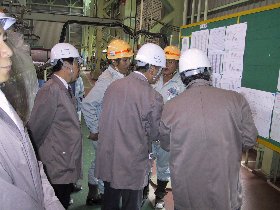
Observer confirming conditions of
field observation (left side)
|
 By the way, I hear that this sort of peer review started following the criticality accident that occurred at a fuel processing facility in Tokai-mura. Under the resolution that such a serious accident must not occur again, peer review was started in order for operators of nuclear-related businesses to share their safety culture and thoroughly ensure nuclear safety. It is intended to mutually check organizational issues and improve the safety of nuclear power generation from all aspects. However, the problem of organizational safety is not limited to nuclear power generation. Since some time ago, various organizational scandals have been revealed. Such organizations seem to have a common problem. It is the problem of "Moral Hazards." It is of paramount importance to prevent "Moral Hazards" for the safety of organizations. Not only organizations, but also the whole of Japan is under the gun of "Moral Hazards." If this cannot be dealt with successfully, organizations themselves will collapse. From my analysis of workplace leadership, personal relations, and members' morale, I find that personal relations at a workplace have a great influence on Morale. In particular, the leadership and influence of managers and supervisors has a significant impact on the Morale of their subordinates. By the way, I hear that this sort of peer review started following the criticality accident that occurred at a fuel processing facility in Tokai-mura. Under the resolution that such a serious accident must not occur again, peer review was started in order for operators of nuclear-related businesses to share their safety culture and thoroughly ensure nuclear safety. It is intended to mutually check organizational issues and improve the safety of nuclear power generation from all aspects. However, the problem of organizational safety is not limited to nuclear power generation. Since some time ago, various organizational scandals have been revealed. Such organizations seem to have a common problem. It is the problem of "Moral Hazards." It is of paramount importance to prevent "Moral Hazards" for the safety of organizations. Not only organizations, but also the whole of Japan is under the gun of "Moral Hazards." If this cannot be dealt with successfully, organizations themselves will collapse. From my analysis of workplace leadership, personal relations, and members' morale, I find that personal relations at a workplace have a great influence on Morale. In particular, the leadership and influence of managers and supervisors has a significant impact on the Morale of their subordinates.
 Those who have high Morale would not take any action that lacks Morals. In other words, when the Morale of a workplace collapses, there arises a situation in which Moral Hazards are likely to occur. If so, to prevent Moral Hazards, it is important to prevent Morale Hazards, which are a prerequisite theretofore. In other words, by raising Morale through personal relations and everyday life, Moral Hazards can be prevented. It can be expected that Moral Hazards can be prevented as a result of raising Morale by showing desirable leadership. Those who have high Morale would not take any action that lacks Morals. In other words, when the Morale of a workplace collapses, there arises a situation in which Moral Hazards are likely to occur. If so, to prevent Moral Hazards, it is important to prevent Morale Hazards, which are a prerequisite theretofore. In other words, by raising Morale through personal relations and everyday life, Moral Hazards can be prevented. It can be expected that Moral Hazards can be prevented as a result of raising Morale by showing desirable leadership.
 What leaders often fail to realize is that their subordinates do not always understand their actual intentions. Leadership can be improved and enhanced by conducting an objective study on leadership (evaluation by subordinates). What leaders often fail to realize is that their subordinates do not always understand their actual intentions. Leadership can be improved and enhanced by conducting an objective study on leadership (evaluation by subordinates).
 This will raise the Morale of the members of the entire workplace and eventually bring about a "Safe Workplace" that where Moral Hazards can be overcome. This will raise the Morale of the members of the entire workplace and eventually bring about a "Safe Workplace" that where Moral Hazards can be overcome.
|
5. Participation and Education

|
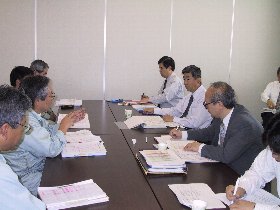
Observer confirming situation of
interviews (far right)
|
 I think that the keyword to raising the desire and satisfaction of those who work at a workplace is "Participation." Employees' participation in various opportunities, such as decision-making processes and safety campaigns, has a significant impact on motivation. I suggest that you raise the desire and satisfaction of employees using "participation" as a keyword. I think that the keyword to raising the desire and satisfaction of those who work at a workplace is "Participation." Employees' participation in various opportunities, such as decision-making processes and safety campaigns, has a significant impact on motivation. I suggest that you raise the desire and satisfaction of employees using "participation" as a keyword.
 Participation has a significant meaning with regard to goals planned in an organization. A goal that is excellent on the surface becomes a pie in the sky if it is not accepted by the members. Under such circumstances, it is doubtful that the goal will be accomplished. It is vital that the goal is accepted and agreed on by all members. Here again the keyword to deciding on the goal is "Participation." The feeling that "we have decided on the goal" seems to be important. Participation has a significant meaning with regard to goals planned in an organization. A goal that is excellent on the surface becomes a pie in the sky if it is not accepted by the members. Under such circumstances, it is doubtful that the goal will be accomplished. It is vital that the goal is accepted and agreed on by all members. Here again the keyword to deciding on the goal is "Participation." The feeling that "we have decided on the goal" seems to be important.
 I would like you to incorporate the spirit of "everyone's active participation" into various activities, including safety campaigns. I would like you to incorporate the spirit of "everyone's active participation" into various activities, including safety campaigns.
 In order for a workplace to be vigorous and safe, after all is said and done, everyday education is essential. It seems important not only to teach and educate, but also to learn and grow together and to "supplement each other." This means to supplement each other with knowledge and energy. The teaching side should be respected by the young. They will be supplied with respect. At your workplace, I would like you to develop "True Education." In order for a workplace to be vigorous and safe, after all is said and done, everyday education is essential. It seems important not only to teach and educate, but also to learn and grow together and to "supplement each other." This means to supplement each other with knowledge and energy. The teaching side should be respected by the young. They will be supplied with respect. At your workplace, I would like you to develop "True Education."
|
6. Spirit and Pride

|
 Hitachi Zosen is involved in nuclear power generation only from an indirect standpoint. Under such circumstances, however, I would like you to have the confidence, spirit, and pride that "we play a vital role in the safety of nuclear power generation." I would like each and every employee to have the feeling of comradeship in that "our very existence keeps the cycle of nuclear power stations turning." It is necessary to be aware that we support nuclear power generation. Hitachi Zosen is involved in nuclear power generation only from an indirect standpoint. Under such circumstances, however, I would like you to have the confidence, spirit, and pride that "we play a vital role in the safety of nuclear power generation." I would like each and every employee to have the feeling of comradeship in that "our very existence keeps the cycle of nuclear power stations turning." It is necessary to be aware that we support nuclear power generation.
 What is produced by our efforts? How it is appreciated? And in what way does it contribute to society? Such contextualization will make one's work pleasant and worthwhile. What is produced by our efforts? How it is appreciated? And in what way does it contribute to society? Such contextualization will make one's work pleasant and worthwhile.
|
7. Conclusion

|
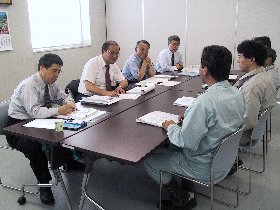
Observer confirming situation of
interviews (far left)
|
 In order for an organization to be vitalized, "moderate crisis awareness" is necessary to begin with. Organizations that keeps in mind that "the status quo is not sufficient" tend to have abundant energy and be full of power for change. In physiological terms, it is called "Homeostasis." When we lack something, the power to restore it works spontaneously. Thus, the driving force of human behavior is lack and imbalance. It is a sort of critical status, out of which the energy for restoration emanates spontaneously. It is important to keep on having a sense of moderate dissatisfaction. In that sense, this peer review itself seems to play such an exciting role. In order for an organization to be vitalized, "moderate crisis awareness" is necessary to begin with. Organizations that keeps in mind that "the status quo is not sufficient" tend to have abundant energy and be full of power for change. In physiological terms, it is called "Homeostasis." When we lack something, the power to restore it works spontaneously. Thus, the driving force of human behavior is lack and imbalance. It is a sort of critical status, out of which the energy for restoration emanates spontaneously. It is important to keep on having a sense of moderate dissatisfaction. In that sense, this peer review itself seems to play such an exciting role.
 Second, it is to "believe that improvement is possible." It is to believe that "you can do it if you try." Any attitude stemming from the thought "It will not change even if I try" will not change people and organizations. I would like you to strive for the vitalization of your organizations with the belief "I will make improvements happen without fail." Second, it is to "believe that improvement is possible." It is to believe that "you can do it if you try." Any attitude stemming from the thought "It will not change even if I try" will not change people and organizations. I would like you to strive for the vitalization of your organizations with the belief "I will make improvements happen without fail."
 Third, I want you to hold on to the belief that "Changing is for my own sake." I would like workplace leaders to recognize this in particular. What will happen if you challenge and succeed in changing your behavior? If you do a good job, you will certainly attain high appreciation and the confidence of everyone around you. If that happens, it will certainly give you a good feeling. Your efforts will eventually be returned to yourself. In the case of an organization, efforts will certainly bear fruit as high esteem from society. Third, I want you to hold on to the belief that "Changing is for my own sake." I would like workplace leaders to recognize this in particular. What will happen if you challenge and succeed in changing your behavior? If you do a good job, you will certainly attain high appreciation and the confidence of everyone around you. If that happens, it will certainly give you a good feeling. Your efforts will eventually be returned to yourself. In the case of an organization, efforts will certainly bear fruit as high esteem from society.
 Fourth, a "sense of mission," that is, "If we don't do it, who will?" is required. We would like to challenge everything with spirit and pride. Fourth, a "sense of mission," that is, "If we don't do it, who will?" is required. We would like to challenge everything with spirit and pride.
 I would like NSnet, who carries out peer reviews, to employ these sets of ideas. In other words, it is to promote peer review itself at all times with moderate crisis awareness, such as "maintaining the status quo is not good enough" and "something must be improved." And I would like you to hold on to the belief, "We can improve peer review if we endeavor to do so." If you actively promote peer review, you will certainly hear opinions of appreciation and gratification, such as "It is very helpful to us that you carry out this kind of peer review." That's when you realize how lucky you are to be able to carry out peer review. I would also like you to carry out peer review with the spirit, "If we don't do it, who will?" I would like NSnet, who carries out peer reviews, to employ these sets of ideas. In other words, it is to promote peer review itself at all times with moderate crisis awareness, such as "maintaining the status quo is not good enough" and "something must be improved." And I would like you to hold on to the belief, "We can improve peer review if we endeavor to do so." If you actively promote peer review, you will certainly hear opinions of appreciation and gratification, such as "It is very helpful to us that you carry out this kind of peer review." That's when you realize how lucky you are to be able to carry out peer review. I would also like you to carry out peer review with the spirit, "If we don't do it, who will?"
 Recently, I advocate "Challenge the Chance to Change Yourself!" In other words, "Let's challenge the chance to change ourselves first." What I want to emphasize by this is to consider that "changing ourselves" is a chance. People are apt to consider "changing" as an "undesirable" or "forced" action. That kind of thought will not cause any change to happen. Instead, it is to accept that "changing yourself" is an "unparalleled chance." And the joy of changing yourself can be experienced because you have challenged doing so. I would like you to do your best with such an attitude. Then, organizations and people will really change. The joy you experience then will surely be exceptional. Recently, I advocate "Challenge the Chance to Change Yourself!" In other words, "Let's challenge the chance to change ourselves first." What I want to emphasize by this is to consider that "changing ourselves" is a chance. People are apt to consider "changing" as an "undesirable" or "forced" action. That kind of thought will not cause any change to happen. Instead, it is to accept that "changing yourself" is an "unparalleled chance." And the joy of changing yourself can be experienced because you have challenged doing so. I would like you to do your best with such an attitude. Then, organizations and people will really change. The joy you experience then will surely be exceptional.
|
8. Participation status of third-party observer (reference)
|
(1) Observer: Dr. Yoshida
Position:
- |
Professor, Kumamoto University |
Main career and posts:
- |
In 1976: earned credits in and then left the doctoral course at the Graduate School of Education of Kyushu University. |
- |
At present, professor at Kumamoto University (Group Dynamics), Deputy Director of Japan Institute of Group Dynamics, Ph.D., after being an assistant at Kyushu University and a lecturer at Kagoshima Women's College. |
Academic circles and associations:
- |
The Japanese Group Dynamics Association (Permanent Director) |
- |
The Japanese Psychological Association |
- |
The Japanese Association of Educational Psychology |
- |
The Japan Academy of Nursing Science |
Major Literature:
- |
"Organizational Safety and Group Viewpoints, Occupational Safety and Health," 2001, No. 751, Roudou Chousakai, pp16-23 |
- |
"Safety of Organizations and People, In search of 'Organizational Safety Knowledge," 2001, Electrical Review, Vol. 85, No. 8, Denkil Hyoronsha Co., Ltd., pp7-10 |
- |
"Safety of Organizations and People, "Organizational Safety" and "Devil's Law," 2000, Sangyo Kunren, Vol. 46,, No. 542, Japan Industrial Training Association, pp26-31 |
- |
"Human Approach to Preventing Medical Accidents," 2001, Nurse Education, Vol. 2, No. 1, The Japan Research Institute, Limited, pp41-44 |
- |
"Safety of Organizations and People, From the Viewpoint of Group Dynamics," 2001, Electrical Review, Vol. 85, No. 5, Denkil Hyoronsha Co., Ltd., pp16-20 |
- |
"Human Aspects of Medical Accidents - Organizational Safety and Group Norms," 2002, The Front Line of Medical Management, Nursing Management Edition, No. 144, SANRO Research Institute, Inc., pp56-58 |
Publications:
- |
"An Introduction to Psychology" (Collaboration), 1979, Fukumura Shuppan, Inc. |
- |
"An Introduction to Personal Relations" (Collaboration), 1988, Nakanishiya Shuppan Co., Ltd. |
- |
"Leadership Theory and Research" (Joint Translation), 1995, Reimei Shobou |
- |
"Leadership and Self Educational Ability" (Collaboration), 1996, Meijitoshoshuppan Corporation |
- |
"Prejudice" (Joint Translation), 1999, Kitaooji Shobou |
- |
"Science of Leadership and Safety" (Collaboration), 2001, Nakanishiya Shuppan Co., Ltd. |
- |
"Group Dynamics for Human Understanding," 2001, Nakanishiya Shuppan Co., Ltd. |
(2) Peer review (location)
 31st peer review (Tamana-gun, Kumamoto Prefecture) 31st peer review (Tamana-gun, Kumamoto Prefecture)
(3) Participation schedule
 For two days, May 20 and 21, of the review term of May 20 to 22, 2003 For two days, May 20 and 21, of the review term of May 20 to 22, 2003
|
Explanation of Terminology
(Note*1) Skills and knowledge required to perform one's job.
(Note*2) Skills and knowledge required to maintain interpersonal relations.
|
|
|







